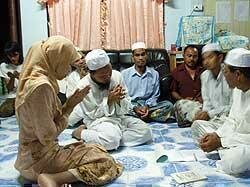BROWSE COUNTRIES/ TERRITORIES
Indonesia's bridal wave
One man, many wives. Should it be a free-for-all? Indonesia gets frisky with the concept of polygamy.
Getting married in Indonesia? Congratulations.
Are you a Muslim, Hindu, Buddhist, Christian or Catholic?
None of the above? Sorry, we don't have that option. Or rather you don't. Under the 1974 Marriage Law, you have to have a religion.
Indonesia as a secular Muslim country has a rather peculiar relationship with the Almighty. It is clearly stated not just in the matrimonial laws but cast in stone in the country's founding principles as well.
Indonesia's first president Sukarno declared Pancasila, or five principles in Sanskrit, to foster national unity among different communities. Despite having the world's largest Muslim population, only 88% of Indonesians are Muslim.
Sukarno wanted to build the new country on the principles of nationalism, internationalism or humanity, deliberation or democracy, social welfare and belief in God. Current President Susilo Bambang Yudhoyono recently re-affirmed the country's need to follow these basic guidelines, which included belief in God with the obligation to practise the Shariah for all its adherents, just and civilised humanity, unity of Indonesia, democracy and social justice.
While discussing the wording of the Pancasila, Indonesian leaders had decided to drop the words "with the obligation to practise the Shariah for all its adherents". Though it was clear the phrase only applied to Muslims, they agreed, following Christian objections, it was discriminatory towards minority groups.
They also decided to use the word Tuhan instead of Allah, which has a less religion-specific implication, and by the way, it's God and not gods.
Indonesia may be rather particular about faithfulness to one god, identity not important, but when it comes to marital relationships, the country is less of a stickler for fidelity.
Assuming the man is an Indonesian Muslim, Buddhist or Hindu, the law technically allows him because of his religion, to take on more than one wife, if his first wife is an invalid, terminally ill or infertile. However, husbands of women who are alive and well, have gone on to take on second wives with no consequences, unless they are civil servants who are not allowed to have multiple wives, or Harley-Davidson riding Muslim evangelists.
Enter Abdullah Gymnastiar, known better to television viewers who can catch him on hundreds of channels across the archipelago as Aa Gym. Bespectacled but still studiously handsome, the charismatic Gymanstiar is popular among more than his fair share of Indonesian ladies. Last December he shocked them all by announcing that he had taken a second wife, a divorced former model who works in a bank.
After the news broke, every other newspaper, magazine, TV channel and dinner party was talking about polygamy. For the purposes of accuracy, this magazine will be specific and use the term polygyny instead, as polygamy technically also includes one-woman-many-husband situations, which is not being tabled for discussion in this country.
What is on the agenda though is whether the government should stiffen the law against such practices, by extending the ban against polygyny beyond civil servants to include all state officials as well. In one lively discussion in the Jakarta Post, a prominent Islamic scholar said yes, because it would curiously enough, help fight corruption. According to him, less male officials will be stealing money to keep their wives happy.
Oh, it would help to protect the welfare of women and children as well, he added.
Masdar Farid Mas'udi, a leader of Nahdhatul Ulema, Indonesia's largest Muslim organisation, however disagreed. He said, polygynous relationships are beneficial to wives as well because they actually "fulfil women's desires and reproductive rights".
"Not every man is up to being a husband, unlike women. Therefore polygamy (sic) is nature's way of balancing the supply of women wanting to be wives, with the demand of men who are up to being good husbands."
Now that would put an end to the all-too-common lament of all the good men being married or gay.
Speaking from personal experience, polygynist and Secretary General of the Justice Prosperity Party, Anis Matta, said in an interview, "If a good match for the woman is already married and she is willing to become a second wife, then why not?"
Being a second wife is in Indonesia, better than being the other half in an adulterous relationship, as a former parliamentarian from the Golkar Party found out.
Yahya Zaini, unwitting You-tube star, resigned after a video of him climbing into bed with Maria Eva, a folk singer, went from her mobile phone to the Internet.
The word on the street is that if he had just taken her as a second wife, his fate would have been different. He might have even gotten a prize for his unflagging libido, like Puspo Wardoyo back in 2003.
Once a humble teacher unhappy with his meager salary, he started a barbecue chicken stall with his wife. Thanks to a rave review by a journalist, he went from selling three chickens a day to 200. Eventually the business grew and so did his number of wives. Wealth increased his desire for other women, he said. After 17 years of monogamy he got a second wife. In the span of three years, he was the proud possessor of four wives and seven restaurants.
That according to Puspo, was all related. As he received the inaugural Polygamy Awards instituted by the Muslim Journalists Association, he noted brightly, "After practising polygamy, my business developed. I believe that this is God's reward for practising polygamy."
Puspo was not the only one being rewarded because of this liaison. His third wife says, "Polygamy has made my life better and increased my status from employee to the boss's wife."
Therein lies the rub. The economic impetus to marry is a strong one. According to the National Commission for Violence Against Women, when people are badly affected financially by situations like the 2004 tsunami, many hurriedly marry off their children, so there will be fewer mouths to feed. In cases like this, daughters feel they cannot reject what has been arranged for them and do not have the financial independence to opt for an alternative.
Women's rights activists in Indonesia are taking a pragmatic stand, advocating education and better enforcement of the current marriage law, to ensure that the permission of the first wife has been sought. According to estimates, some 30% of all marriages in Indonesia are polygamous, and whether spoken about or not, it is a reality of Indonesian society.
President Susilo Bambang Yudhoyono, who is himself monogamous, was forced to respond to Gymnastiar's taking of a second wife. His mobile was constantly ringing when his special SMS-the-President service was inundated by messages. He proposed to extend the ban against polygyny to all state officials, possibly including mayors, governors and parliamentarians. But some Muslim clerics want the President's hands off what they say is permissible under Islam.
This is the other reality of Indonesian society, a constant power struggle between the religious and the secularists. The religious want Islamic law to be the basis for Indonesian society, while the secularists want to restrict religion's influence to personal lives.
During Suharto's 32-year reign, clerics were muted along with others who the then-president believed would endanger his autocratic control of the state. When he fell, there were calls for Islam to have an institutionalised role in the country, as a backlash against the secularism associated with Suharto. In a compromise reflecting conflicting forces within Indonesian society, Abdurrahman Wahid, an influential Muslim cleric against Islamising the country was elected president in 2001.
When his own fall from grace came amidst accusations of corruption and incompetence, his vice president Megawati Sukarnoputri, not without the advantage of a powerful last name, succeeded him to become the country's first female president and the first female head of state in a predominantly Muslim country. Her own vice president was Hamzah Haz, who has admitted to three wives, but is rumoured to have four.
Such is the complexity of the identity of Indonesia. It is not so much a Muslim country, as it is a country that is home to many Muslims. The brand of Islam in South-east Asia is more liberal than the Islam that is practised in the Middle East, but it remains a conservative patriarchal religion.
Indonesian filmmaker Nia DiNata produced a highly acclaimed film Love for Share, based loosely on her own experiences in a polygynous family. Yet apart from in Jakarta and Bandung, her film was not a big box office draw in other parts of Indonesia. During her promotional tour around the country, men called in on radio talk shows criticising her stand against polygyny. Women for the most part she felt, were too timid to even touch the subject.
In a 2006 survey, almost half of all Indonesians polled said that adulterers should be stoned, as called for by Shariah law. On the issue of polygyny, 40% (56% of men and 24% of women) said a man should take more than one wife. The figures are similar to those recorded in 2004 and 2005.
This apparent support for the principles of Shariah law translated into Islamic parties garnering 20% of the vote in the 2004 national elections. The ruling Golkar Party won with just under 22% of the vote, and second-placed PDI-P barely made 19%. The Islamic vote was not as strong in 2004 as in 2001, but still somewhat significant.
Conservative mosques have been attracting more worshippers, with their promises that Islam and Shariah are key to alleviating poverty and reducing immorality, and judging from the poll figures, Indonesia's political parties might want to take a leaf from their religious counterparts.
That is the troublesome bit about democracy. Regardless of what you stand for, it all comes down to getting the most votes.
The next elections are in 2009 but as the Americans have shown, it is never too early to start garnering support.
Especially when unlike former resident Barack Obama, you don't have a big budget, and like for him, the polls seem to be a free-for-all.
Login or Register
 Dan-Chyi Chua began her writing career with Channel News Asia, a regional cable network, before forsaking broadcast journalism to hit the road for a three-year sabbatical through the Middle East, China, Central America and Cuba. She has now grounded herself as a writer for asia! Magazine.
Dan-Chyi Chua began her writing career with Channel News Asia, a regional cable network, before forsaking broadcast journalism to hit the road for a three-year sabbatical through the Middle East, China, Central America and Cuba. She has now grounded herself as a writer for asia! Magazine.
- Asian Dynasties and History
- Conservation of the Environment
- Definition: Culture
- Economy and Economics
- Food and Recipe
- Geopolitics and Strategic Relations
- Health and Body
- Of Government and Politics
- Religion and Practices
- Social Injustices and Poverty Report
- Society, Class and Division
- Unrest, Conflicts and Wars

































 Another Point
Another Point From Jerusalem to the West Bank
From Jerusalem to the West Bank
Comments
Post new comment